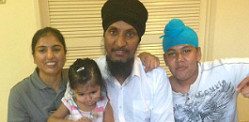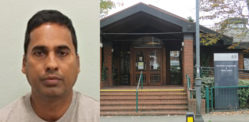"I wished myself dead at that point"
There’s no denying that there are many taboos that still exist within South Asian culture, and being homeless is one of them.
Whilst the judgement and lack of safe spaces related to homelessness are found everywhere, there’s a certain narrative of it among South Asians.
Many associate sleeping rough with a lack of ambition and education, and is the individual’s fault.
But, what is it like for those who have first-hand experiences of this issue?
We spoke with Simranjeet Kaur from Birmingham who shares her account of being homeless at the hands of her family.
Whilst she shares the details of her journey into recovery, she admits that there are far more South Asians on the street than people are aware of.
Her words are a raw, unfiltered account of survival, hope, and strength.
Simranjeet first goes into her upbringing and the kind of environment she experienced:
“I never thought I’d be telling my story like this, but I figured it was time to share.
“My reality was way different not too long ago. I was stuck away in cold and damp alleys in Birmingham. That’s what I used to call home most of the time.
“Struggling to stay warm, being another face on the streets, people look at me with disgust, begging for money – it’s all things we have to do to deal with being homeless.
“I did feel like it was a bit different for me.
“You don’t see many Asian homeless people, but I can tell you that we are here.
“Growing up in a Punjabi family, life wasn’t exactly a walk in the park.”
“We weren’t rolling in money, but we had enough to get by.
“Life in the 80s was different, daughters didn’t go off to university, and my dad expected me and my sister to either stay at home or work in his factory.
“Many of my cousins would get married and live their lives at home, or some would end up not marrying at all and doing stuff around the house.
“I did want more for myself, but when you’re young and have a strict father, you don’t have much say.
“So, I worked with him. However, it was more fetching teas and food for the men around the machines.
“Creepy old men, they were too.
“They were all from India, exposed to a new side of life, and had this attitude that because I was born in England, they had a right to look down on me for not being ‘Indian’ enough.
“At first, it wasn’t too bad and some days were better than others.
“It was actually on the weekends I had the most fun at the factory because the workers were off.
“So, it’d be me and my sis cleaning or helping dad with deliveries.
“And, I felt like me and my dad bonded during that time.
“I felt like he was proud that he had two daughters who weren’t afraid to work and do ‘hard labour’, compared to others in the community who were just at home.
“And that was pretty much our lives for most of our childhood and teenage years.
“I was in my 30s when marriage talk came around, which was quite late back in the day (probably still is, to be honest).
“But I wasn’t ready to settle down with someone, I barely had time to be my own person.
“I never dated, kissed a guy, or had anything romantic at that stage ife because all I did was work and be with friends.
“As I said, my dad was quite strict so he still had this idea that girls shouldn’t have too much freedom.
“But he was so hellbent on getting me married off that I felt like the only solution to avoid it was going to university.
“This was something he already didn’t agree with.
“But, by then, he became more lenient towards the idea. Asian parents and a ‘good education’ is like an unbreakable bond.”

Although her father was strict, Simranjeet eventually got her wish of going to university.
However, she would quickly recount that this sparked a domino effect for the rest of her life:
“When I finally got to university, it was like the shackles were off and I had this new lease of life.
“I remember my first night out with some older students. It was around 11 pm and I was worried because that was my curfew at home.
“I said to everyone that we should head back and it came as such a shock when they said the club doesn’t shut till 3 am.
“This wasn’t common sense to me at the time. My mates were even more shocked that I didn’t know what true nightlife was like.
“So, you can imagine they had a field day when they found out about my love life, well lack of it.
“I think in a week, I had spoken to more guys than I did in my 30+ years of life. It also helped that I was seeing more Asians in the clubs, so I felt safer in a way.
“I always had the idea that they weren’t allowed to go out like I wasn’t allowed to.
“But this was the start of the end for me.”
“I think this hit of reality was what I had been missing, but because of how late I experienced it, I felt like I had years of catching up to do.
“So I was going out more, missing classes, drinking a lot etc. It was worse because I felt like I wasn’t doing anything wrong.
“After all, the other students were doing it.
“But, I kept forgetting that these were young teenagers and I was working in a factory when I was their age.
“These students are young and naive but I’m a grown-ass woman. Although, I wish I had those thoughts at the time.
“I used to call home every day, but it turned to once every few days, then once a week, and then I would purposely miss calls from home or my dad.
“It would land me in trouble. But because I was far away from them, I thought I’d get away with it anyway.
“After a while, my parents were sent a letter home about my attendance.
“I told them that the university does that to scare students and everyone got one.
“But, that excuse went out the window when they got another one from my tutor about my participation and missed assignments.
“My dad was livid and mum was too angry to even speak. That phone call lasted 10 minutes but it felt like 10 hours.
“I couldn’t get a word in and my dad was so angry and had this concept of ‘what I say goes’.
“As he didn’t want me going to uni in the first place, he was basically like ‘I told you so’.
“Then he started blaming my mum and sister whilst I was on the phone and that was unfair.
“When I spoke back to him, he warned me to never show my face in the house again otherwise I wouldn’t make it back out.
“Women didn’t talk back like in my dad’s generation so for me to do that was like I was spitting in his face.”
“But, I just said ‘fine’ and hung up.”
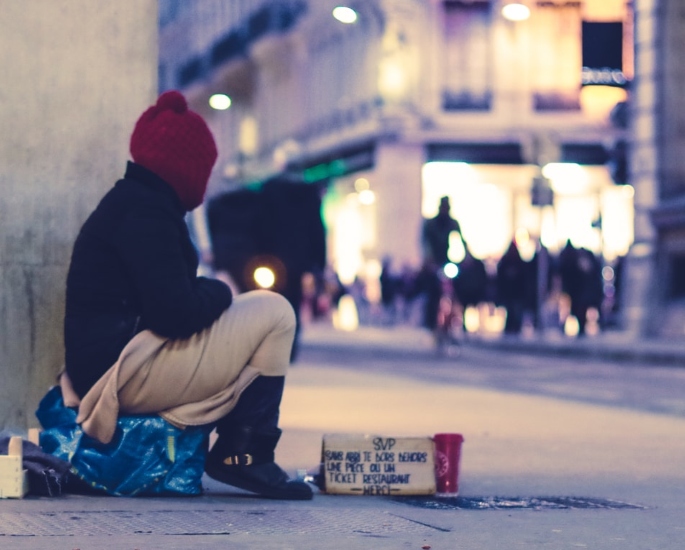
Simranjeet admits that university life was so new and refreshing to her that it was too good not to enjoy.
Whilst one could argue that she overindulged, the Birmingham native is aware of the lack of accountability she took at the time.
Simranjeet goes on to speak of the aftermath of the torrid conversation between herself and her parents, and how serious life had just become:
“A month or so later, my sister called me to say dad had packed up my stuff. I was genuinely so shocked.
“I thought she was lying at first but I knew I had to get home quickly to avoid being kicked out.
“When I got there, my mum let me in and we got into an argument. My dad then walked in and went to slap me.
“He told me that I disrespected the family name, that I had been off mixing with boys and that I should be ashamed.
“He told me my cousins and everyone else knew about my behaviour and how I’ve been clubbing, kissing men, missing uni etc.
“So I told them ‘I don’t fucking care’.
“Then my dad replied ‘I won’t have a whore as a daughter’, and kicked me out.
“I know it was initially my fault that I was misbehaving but as parents, you can’t just kick your child out on the streets.
“I essentially felt like I’d been made homeless for going to university.”
“It’s like my dad had this resentment about me being away from home and this was the perfect situation for him to take his anger out on me, and in the most extreme way.
“My age helped me in this scenario because I was able to fall back on savings, apply for jobs and make it through the rest of the university year.
“Whilst I spoke to my mum and sister, they would hang up when my dad got home.
“I did try and go back to my house but they wouldn’t open the door. It was a crazy feeling to be immediately shut out like that.
“To be honest, I don’t think I’ve truly processed that yet.
“University ended up a failure. I could barely support the accommodation fees and living away from home.
“I found myself asking friends if I could sleep at theirs or staying at hostels for free.
“Imagine navigating life without a roof over your head, without the warmth of a home-cooked meal, and your family.
“That’s where I found myself – alone, vulnerable, and with nothing but the clothes on my back.
“The world can be a harsh place, and being homeless is even harsher.
“The hostel I stayed out was tough and my bags were eventually stolen by some people when I went out to work.
“So all I had was a backpack with a couple of t-shirts, some underwear and toiletries to last a week or so.
“I was working in a Poundland and because I couldn’t shower daily, my colleagues started to notice.
“When I told them my situation, my manager found out and said I was a liability because they wouldn’t be able to trust me as an employee.
“I think they had this judgement that homeless people were ‘tramps’ and they couldn’t have that type of image.
“So I now found myself without a job, without food, without clothes and away from anyone I ever knew.”
As Simranjeet said, she lost everything in the blink of a moment.
She felt that her parents had turned their backs on her.
Even though she was partly responsible, she makes the case that parents should always help their kids through those difficult periods.
But, as highlighted, Simranjeet’s father thought she brought shame on the family – a common attitude found in certain South Asian families.
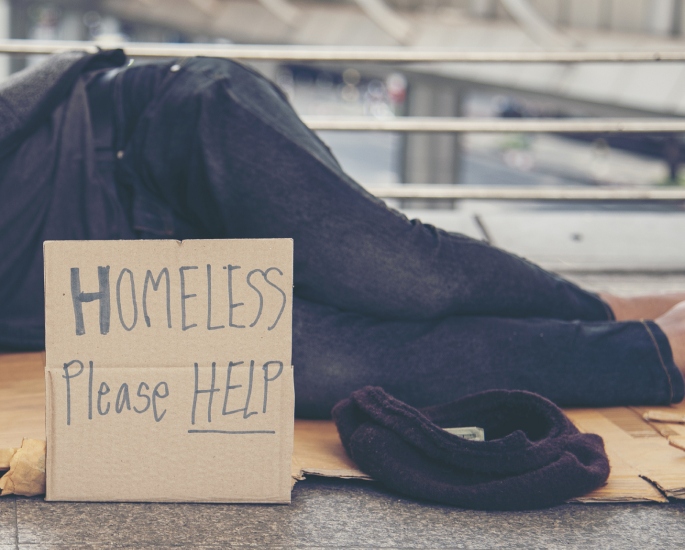
Simranjeet goes on to detail her experiences living on the streets:
“Nights were the toughest.
“The darkness seemed to swallow me whole, and I’d huddle in whatever corner I could find, hoping for a few hours of rest.
“Trust me, trying to sleep in the cold, outside, vulnerable, and as a woman is terrifying.
“You have people on drugs or drunk out of their minds.
“And, these are people who have been homeless for years and they’re not afraid of harming someone if it means an extra blanket or change.
“There is one incident that I won’t ever recover from.
“I made enough money to have a McDonalds and went to a car park so none of the others could see me with food.
“But, I was followed by two guys and eventually, when it was a bit darker, they snatched my food and began to push me around.
“I tried to defend myself but I was too weak. One of them pinned me down and their alcohol spilled all over me.
“They tried to take my clothes off but luckily one of the car alarms went off and they ran with my food and my clothes half off.
“I just laid there crying my eyes out. It was so scary and I wished myself dead at that point.
“It was like I was a faulty car alarm away from being raped – what a revolting thought.
“I just couldn’t believe how much my life had changed so quickly.
“After weeks and months of walking the streets, I barely had more than three meals a week. And, those would be my only meals of the day.
“I eventually started to visit a temple, knowing I could pray, be closer to God and have a warm meal. It’s one thing I’ve noticed about my faith, we truly are accepting.
“And, I think that was a turning point for me. There was a familiarity there but I knew I couldn’t keep going to the temple to eat, it was disrespectful of me.
“I kept thinking of my dad in those times and just his face full of disgust due to what I had become.
“For me, there was a shelter in Birmingham that became a lifeline.
“It wasn’t much, but it was a place to escape the cold and maybe catch a few hours of sleep without the constant fear of the unknown.
“The shelter became my refuge, and it was there that I met others who, like me, were trying to piece together shattered lives.
“We formed a bond and shared our struggles.”
“It’s amazing how quickly your priorities shift when your entire world is just surviving.
“One night when I was in the shelter, a volunteer approached me and spoke to me with genuine compassion.
“She asked me about my life, my story and didn’t pity me. That conversation changed everything.
“We talked about my dreams and even though she was white, she understood the cultural barriers I faced.
“She empathised with me and told me of other Asian women who said the same things to her.
“She saw potential in me that I had long forgotten existed.
“It’s funny how a few words of encouragement can reignite a spark in you.
“With her support, I managed to attend some training programs and job fairs for the homeless.
“She also took me to support groups where I could speak with other women about my story. Eventually, I went to more groups and met more Punjabi women who I could help.
“Slowly but surely, I started to rebuild.”
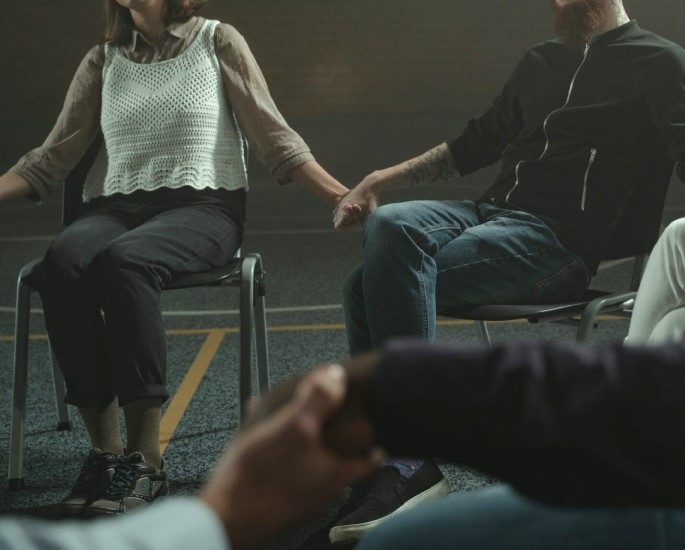
With all the frightening and fragile incidents Simranjeet had to endure, she was finally met with some positivity.
A little encouragement, belief, and friendship inspired her to persevere and work towards a fulfilling life:
“The first step was a job – a humble one, but it was a start.
“Even though I was on minimum wage, I worked long hours, saved every penny, and began to feel stable again.
“I was lucky I didn’t fall into drugs and alcohol as many people do. But it was the face of my father that inspired me to push through.
“There was this constant thought in my head of ‘don’t prove him right’.
“Rebuilding wasn’t just about finding a job and a place to live; it was about rediscovering my identity.
“I reconnected with my roots, drawing strength from my faith and prayers.
“And so, my life transformed. Through the kind woman and hostel, I managed to move into a shared house with another woman and her child.
“The first night under a roof was surreal – I half-expected to wake up and find myself back in that alley.
“I enrolled in online classes and I’m on my way to receive a diploma of higher education.
“I also volunteered back at the hostel which changed my life. I run conversations with other Punjabi women to help them through their struggles.
“We don’t just get homeless people, but victims of domestic abuse.
“I wanted to make sure that there is a space for people like me. Even though times have changed, people’s attitudes haven’t.
“A lot of Asian women find themselves seeking help and don’t know where to go.
“We’ve had a lot of success in these early days but we’ve had a lot of backlash also.
“A lot of men try to stop their wives from coming or find out and try to shut us down.
“Unfortunately, that’s why we have to remain anonymous and careful so we can carry on running.
“Eventually when we have more security and safety, we can open our doors up and expand further.
“But let me be real with you. The scars of homelessness don’t fade easily.
“There are still nights when I wake up in a cold sweat.”
“But, here I am and want to say to others who are going through this or feel like they’re in danger, there are support systems out there.
“We as a culture need to change also. We need to open up about homelessness and not make it so stigmatised.
“It can happen to anyone and doesn’t make you any less Punjabi or Asian.”
Simranjeet’s emotional journey serves as a reminder of the unpredictable twists and turns that many South Asians can face.
Her story of being homeless and overcoming this issue serves as hope to others in similar situations.
Moreover, her words can help break down the stigma related to homelessness, especially in Desi communities.
Hopefully, Simranjeet’s story helps break this taboo down so those in the future can feel safer and have more resources to combat homelessness.
If you are or know anyone suffering from homelessness, reach out for support. You are not alone.
- Crisis – 08000 384838
- Shelter England – 0808 800 4444
- The Salvation Army – 0207 367 4500

























































